|
Printables |
PowerPoints |
Online exercises |
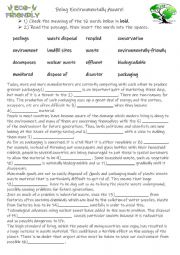
|
Being Environmentally Aware
Reading passage with a gap fill exercise about how companies and people need to be more aware of saving our environment. This sheet is suitable for higher level B1 to B2 students of all ages. An answer sheet is included.
Level: intermediate
Age: 12-100
Type:
Downloads: 2058
|
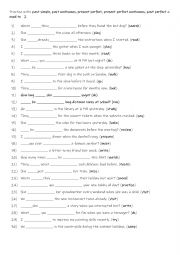
|
perfect, presenA2+-B1 Practise with past simple, past continuous, present t perfect continuous, past perfect & used to 2
Practising these tenses helps students express different aspects of time and actions effectively. The past simple is vital for describing completed actions, while the past continuous sets scenes or shows interruptions in the past. The present perfect connects past actions to the present, and the present perfect continuous highlights ongoing or repe...
Level: intermediate
Age: 9-100
Type:
Downloads: 113
|
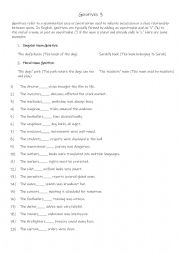
|
A1+-A2 Genitives (3)
This worksheet is suitable for A1+-A2 level students. Genitives refer to a grammatical case or construction used to indicate possession or a close relationship between nouns. Students complete the 20 sentences after reading the rules. Answers on page 2
Level: elementary
Age: 7-100
Type:
Downloads: 117
|
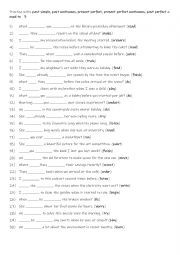
|
A2+-B1 Practise with past simple, past continuous, present perfect, present perfect continuous, past perfect & used to 3
Practising these tenses helps students express different aspects of time and actions effectively. The past simple is vital for describing completed actions, while the past continuous sets scenes or shows interruptions in the past. The present perfect connects past actions to the present, and the present perfect continuous highlights ongoing or repe...
Level: elementary
Age: 10-100
Type:
Downloads: 122
|
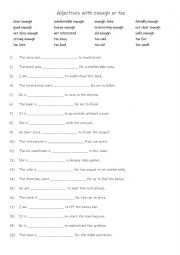
|
A1+- A2 Adjectives with enough or too
Students read the sentences, then complete the gap-fill with the logical choice in bold. After checking the answers this worksheet could be used as a speaking reinforcement activity for pairs or small groups. Answers on page 2.
Level: elementary
Age: 8-100
Type:
Downloads: 117
|
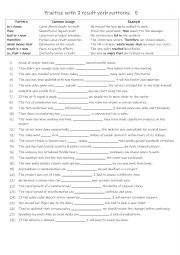
|
B1-B2 Practise with 7 result verb patterns 5
First, students need to familiarise themselves with the 7 result verb patterns and use. Then they read the sentences to work out which one is needed to complete the gap-fill. Each verb pattern is used 4 times! Answers on page 2.
Level: intermediate
Age: 11-100
Type:
Downloads: 109
|
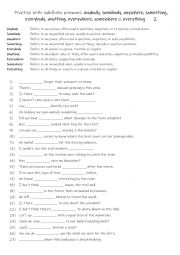
|
A2-B1 Practise with indefinite pronouns anybody, somebody, anywhere, something, everybody, anything, everywhere, somewhere & everything 2
First, students need to familiarise themselves with the 9 indefinite pronouns and their meanings and use. Then they read the sentences to work out which one is needed to complete the gap-fill. Each word is used 3 times! Answers on page 2
Level: elementary
Age: 10-100
Type:
Downloads: 112
|
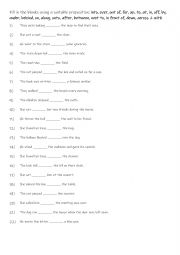
|
A2-B1 Fill in the blanks using a suitable preposition: into, over, out of, for, up, to, at, in, off, by, under, behind, on, along, onto, after, between, next to, in front of, down, across & with
Students familiarise themselves with the prepositions and their meanings. Then they read the sentences to see which preposition is needed to complete the sentences. Answers on page 2.
Level: intermediate
Age: 8-100
Type:
Downloads: 114
|
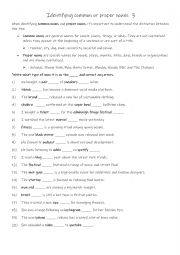
|
Identifying common or proper nouns 3
First, students need to familiarise themselves with the 2 types of nouns. Then they read the sentences to identify and use the correct punctuation for all of the sentences. Answers on page 2
Level: elementary
Age: 8-100
Type:
Downloads: 111
|
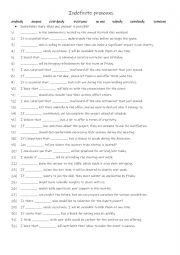
|
A2+-B1 Indefinite pronouns
Learning indefinite pronouns is important for clear communication, as they refer to nonspecific people or things, enhancing understanding in both spoken and written language without naming specific individuals. They allow students to express inclusivity, as in "Everybody is invited," and avoid repetition, keeping sentences concise and fluid. Additi...
Level: elementary
Age: 8-100
Type:
Downloads: 132
|
|
|
|
|












